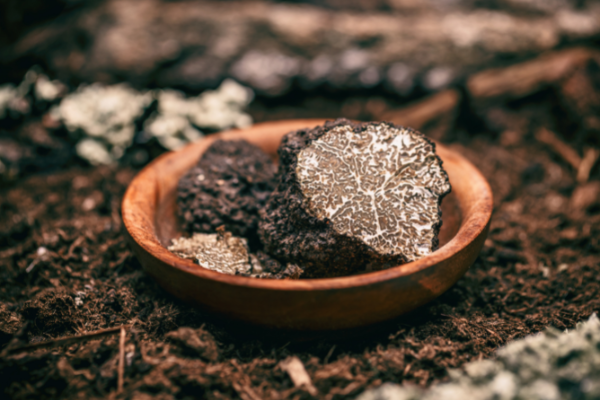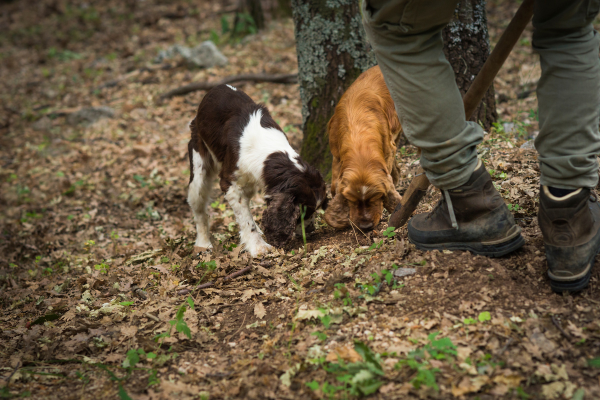Before understanding the high desire of the truffle, one must understand the history of the truffle and where it began its journey. A truffle is a fungal fruiting body that develops underground. Truffles are typically found closest to trees. The word truffle comes from a Latin word “tuber” meaning outgrowth.
Truffles can be dated back to the ancient Egyptians where the truffles were coated in goose fat then served in a high regard. There are multiple species of truffles yet they are difficult to cultivate on one’s own. It could literally take many expensive years to create but decades to actually turn a profit on those very truffles. Authentic and true truffles are often costly when purchasing due to the scarcity and accessibility.


Next time you’re in the craving for some truffles I would urge you to use the truffle salt that we carry in our store as a finishing salt. You'll most definitely want to make our famous Truffled Popcorn, which I will warn you is addicting!
Vegan Truffle Mac and Cheese
Scroll down for a printable version of this recipe
Serves: 6
Prep time: 15 minutes
Cook time: 15 minutes
2 cups water
1/2 cup raw cashews
1/4 cup nutritional yeast
3 Tablespoons cornstarch
1 Tablespoon white miso paste
1 Tablespoon truffle olive oil
3/4 teaspoon salt
1/4 teaspoon garlic powder
1/4 teaspoon black pepper
3 cups Cavatappi noodles
Breadcrumbs or panko
TCB truffle salt to taste
- Make the cheese sauce by adding 2 cups of water along with the cashews, nutritional yeast, cornstarch, miso paste, truffle oil, salt, garlic powder, and pepper to your blender until it is completely smooth. At this stage, the sauce will be quite watery. Set aside.
- Bring a large pot of water to a boil and then cook the pasta according to the package directions.
- Drain the pasta and quickly rinse the pot to remove any leftover starch from the pasta water. Return the empty pot to the heat.
- Pour in the cheese sauce. Cook over medium-high heat, stirring frequently and scraping the bottom of the pan with a spatula until the sauce thickens about 5 minutes. Add the cooked hot pasta to the sauce and toss to coat. Serve hot.
- Top with breadcrumbs and TCB truffle salt.
Want to learn how to make your own pasta from scratch? Join us for Hands-On Pasta Workshop on Saturday, July 23 at 10am at Lincoln Square.
And if you want to learn more vegetarian dishes, don't miss our virtual Summer Vegetarian class on Friday, July 16 at 6pm CST. Choose the cook along option to make the following menu along with our chef as you get real-time feedback along the way:
- Summer Corn and Herb Chowder
- Tomato Puff Pastry Tart with Goat Cheese
Vegan Mac n' Cheese
Ingredients
- 2 cups water
- 1/2 cup raw cashews
- 1/4 cup nutritional yeast
- 3 Tablespoons cornstarch
- 1 Tablespoon white miso paste
- 1 Tablespoon truffle olive oil
- 3/4 teaspoon salt
- 1/4 teaspoon garlic powder
- 1/4 teaspoon black pepper
- 3 cups Cavatappi noodles
- Breadcrumbs or panko
- TCB truffle salt to taste
Instructions
- Make the cheese sauce by adding 2 cups of water along with the cashews, nutritional yeast, cornstarch, miso paste, truffle oil, salt, garlic powder, and pepper to your blender until it is completely smooth. At this stage, the sauce will be quite watery. Set aside.
- Bring a large pot of water to a boil and then cook the pasta according to the package directions.
- Drain the pasta and quickly rinse the pot to remove any leftover starch from the pasta water. Return the empty pot to the heat.
- Pour in the cheese sauce. Cook over medium-high heat, stirring frequently and scraping the bottom of the pan with a spatula until the sauce thickens about 5 minutes. Add the cooked hot pasta to the sauce and toss to coat. Serve hot.
- Top with breadcrumbs and TCB truffle salt.
